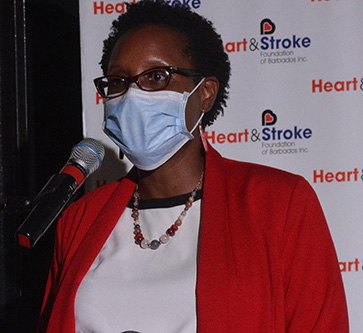Disclaimer: The views and opinions expressed by this author are their own and do not represent the official position of the Barbados Today.
by George Alleyne
“I considered myself a fit individual, and the last thing that would happen to me is that I would get a heart attack.”
That statement came from Nigel Griffith, a now 62-year-old man extraordinarily active in sports, who fell victim last year May and went through denial before going to the hospital.
The discomforts associated with early heart attack came after a game of squash, which he played almost daily.
“I remember even speaking to a nurse and I told her ‘girl, I feel real bad’. She stopped speaking, stared me in the eyes and asked, ‘Nigel, you certain you ain’t getting a heart attack?’
“My response to her was to suck my teeth because
she really couldn’t have meant me, not the healthy person, not the active person.”
Griffith’s arrogance in the face of a developing heart attack reflects what medical experts call a mythical belief among most persons that once they lead a physically active lifestyle and stay away from bad foods and drinks, they would not fall victim to this dreaded and potentially life-ending assault on the heart and coronary system.
“Nigel is not your average person. He is very physical.
He is a squash player and bikes,” observed Queen Elizabeth Hospital’s Consultant Cardiologist Dr Dawn Scantlebury, adding that he leads an overall healthy lifestyle.
“Despite all of this, healthy eating and not smoking and not drinking, etcetera, Mr Griffith suffered a heart attack on May 19, 2019,” she said.
QEH Non-invasive Cardiology Specialist Dr Aderemi Soyombo pointed out, “There are different kinds of heart attacks. So it is important that you understand as a healthy person, yes, you could have a heart attack”.
“You should be very aware of your body and your symptoms and seek help when you can. A lot of the people that we see that come in with heart symptoms tend to have other chronic illnesses.”
Griffith’s admission of overconfidence and comments by the two medical professionals came as the Heart and Stroke Foundation twinned observances of World Heart Day and the organisation’s 35th anniversary with a lecture and panel discussion in the Walled Garden Theatre of the Barbados Museum and Historical Society last month.
“I considered myself to be a rather healthy and athletic individual living what you would consider a normal life,” said Griffith, a member of the discussion panel and a cardiac patient of the Foundation.
“I had given blood on Tuesday and I then went on to play a squash match the Tuesday night… went to work. And again, played another tournament match on Wednesday night. Felt comfortable, so therefore I repeated the exercise the Thursday.”
The Thursday game was brought forward to 11 a.m. because of the day’s heat and he drank water after the match, Griffith said, adding, “It was about midday that I felt myself having what I thought was indigestion because of the drink I had taken. It was my chest just being squeezed extremely tightly, and I disregarded it.
“My chest was squeezing all the oxygen out of me. I opened my chest [inhaled deeply] to see if I could get any air in, but nothing happened. I repeated the exercise for a little while. Nothing happened.
“I then left inside the Squash Club, went outside where there would be more oxygen and repeated it [the exercise]. Still, I did not feel any better.”
Nonetheless, Griffith drove to a location to pick up his daughter with the intention of taking her to work, but the discomfort at that stage had become overwhelming and he called a friend to drive his car.
“And it was only after that I sought medical attention.”
At the hospital, the heart attack was diagnosed, and he associated it with the physical activity almost immediately following the blood donation.
But Dr Soyombo advised not to be so sure about that.
“Most people have risk factors, whether it is hypertension or diabetes or high cholesterol or smoking or family history. There are other things that we don’t know in our genetics that predispose us, [and explains] why Mr Griffith had a heart attack.”
She said that precise reasons for some heart attacks are still being studied so uncertainty remains on, “whether it was the blood [donation] and the physical activity”.
While advising regular check-ups with physicians, she concedes that anyhow, “There are some people who do that every year and they still come in with a heart attack”.
Yet, “The people that do the best… are those that are active, healthy. They do much better than people who are sick to begin with”.
The doctor’s advice to potential heart attack victims is to try not to drive yourself to the hospital and wherever possible, avoid being taken in by someone and opt for the ambulance.
“You come in with the ambulance, you’re going to be the first to be seen. Your family brings you in, you might be sitting there waiting in the waiting area before they even do an ECG [that detects heart issues].
“I understand that sometimes it can take an hour for an ambulance and they’re working on those things.
“Call 911 if you think you’re having a heart attack or a stroke.” (GA)




